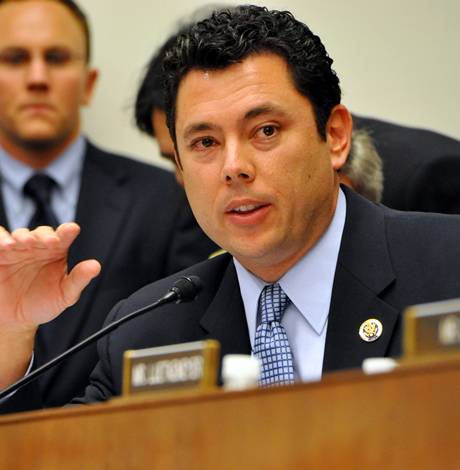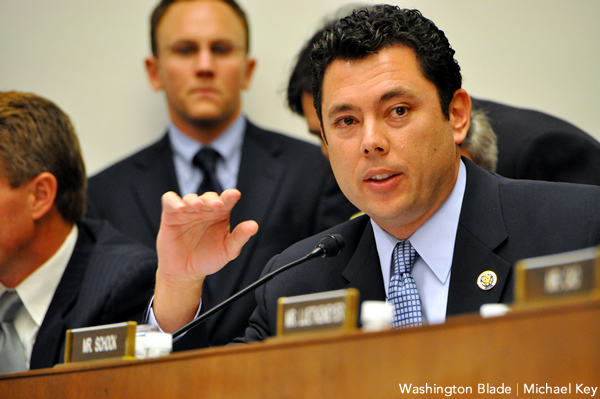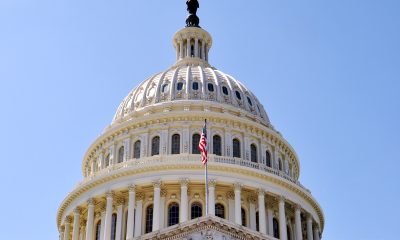News
Hearing in the works for federal ‘religious freedom’ bill
Critics say measure would enable anti-LGBT discrimination


Rep. Jason Chaffetz (R-Utah) is planning a hearing on “religious freedom” legislation for the House Oversight & Government Reform Committee. (Washington Blade file photo by Michael Key)
Congress has mostly stayed out of the “religious freedom” fight as states pass legislation allowing anti-LGBT discrimination for religious reasons, but that may soon change.
A U.S. House committee is planning a hearing on the First Amendment Defense Act, a “religious freedom” bill with the purported purpose of preventing federal government action against individuals and businesses that oppose same-sex marriage for religious reasons. Critics say it essentially carves out a legal exemption for anti-LGBT discrimination.
The legislation was introduced by Rep. Raul Labrador (R-Idaho) in the U.S. House and Sen. Mike Lee (R-Utah) in the U.S. Senate.
M.J. Henshaw, a spokesperson for the House Oversight & Government Reform Committee, said the panel is “working towards a hearing” on the legislation, although no date has been scheduled.
A follow-up email on whether the hearing was likely before the end of this month wasn’t returned. It remains to be seen if a committee vote or consideration on the House floor will follow the hearing.
Chaired by Rep. Jason Chaffetz (R-Utah), the House Oversight & Government Reform Committee is packed with conservative Republicans, including Rep. Steve Russell (R-Okla.), who recently attached to a major defense spending bill an amendment that would undermine President Obama’s executive order prohibiting anti-LGBT workplace discrimination among federal contractors.
The anti-LGBT National Organization for Marriage has been pushing for a hearing on the First Amendment Defense Act in a campaign it calls “Fax for FADA.” The effort encourages supporters to sign a petition in support of the legislation, which triggers a fax sent to House Republican leadership and the House Oversight & Government Reform Committee. According to the National Organization for Marriage’s website, the petition as of Wednesday had 3,870 signatures.
Brian Brown, president of the National Organization for Marriage, wrote in a blog post the “Fax for FADA” effort “is making a big impact.”
“Word is that the First Amendment Defense Act (FADA) will be scheduled for a hearing very soon,” Brown writes. “Our faxes to the House Republican leadership and members of the House Oversight and Government Reform committee are having an impact!”
Upon its introduction last year in an attempt to counter the expected ruling from the U.S. Supreme Court in favor of same-sex marriage nationwide, the First Amendment Defense Act is seen as an attempt to make a carve out into that decision without entirely overturning it.
Among other things, LGBT advocates have said the legislation as introduced would 1) permit a federal employee to refuse to process tax returns, visa applications or Social Security checks for same-sex couples; 2) allow recipients of federal grants and contracts, including those for social services programs like homeless shelters and substance abuse treatment programs, to turn away LGBT people; and 3) permit anyone who believes they have been somehow required by the federal government to approve of married same-sex couples to file a lawsuit and potentially receive damages from taxpayer funds.
Roddy Flynn, executive director of the LGBT Equality Caucus, said the legislation is akin to controversial state anti-LGBT laws recently enacted in North Carolina and Mississippi, calling the planned hearing the latest “in a string of attacks on LGBT people.”
“First North Carolina and Mississippi, then the NDAA amendment, now a hearing on FADA, some lawmakers are determined to permit discrimination at all costs,” Flynn said. “These measures are not about religious liberty or the First Amendment, they are attempts to roll back hard fought protections that provide stability and security to LGBT people. With the incredible backlash against North Carolina’s law, it is shocking some lawmakers are doubling down on this much more radical bill. FADA goes far beyond North Carolina’s anti-LGBT law, giving a license to discriminate for anyone who doesn’t like LGBT people.”
On the Senate side, Lee has presented a new version of the First Amendment Defense Act that limits that carve-out for opponents of same-sex marriage, although the update hasn’t officially been filed.
The new version, which is displayed on Lee’s website, spells out protections from government action won’t apply to publicly traded for-profit entities; federal employees acting within the scope of their employment; federal for-profit contractors acting within the scope of their contracts; and hospitals and nursing homes with respect to visitation, decision-making on health care and certain treatments.
Conn Carroll, a Lee spokesperson, said Tuesday the version of the First Amendment Defense Act on Lee’s website is the “up to date” version of the legislation.
“This finalized version of the First Amendment Defense Act, which we’ve been working with religious liberty experts on for months, makes crystal clear that we are only seeking to prevent federal government discrimination against people and institutions that define marriage as a union between one man and one woman,” Carroll said.
On the House side, Labrador’s office didn’t respond to the Washington Blade’s request to comment on the article or to confirm if the updated Senate version is the new House version as well.
Ian Thompson, legislative representative for the American Civil Liberties Union, said the legislation remains discriminatory against LGBT people regardless of the change.
“It is disappointing that some Republicans in the House have failed to learn the lessons that Governors Pence, McCrory and Bryant now know all too well,” Thompson said. “Embarking down this discriminatory road is going to meet with the swift backlash that it deserves.”
Thompson said one example of discrimination the bill would still allow is permitting certain federal contractors or grantees, including those that provide social services like homeless shelters or drug treatment programs, to turn away LGBT people, same-sex couples or anyone who has a sexual relationship outside of a marriage, such as a single mother.
“Whether in its original or 2.0 versions, FADA is about permitting taxpayer-funded discrimination,” Thompson said. “This legislation is beneath who we are as a nation. I hope that Speaker Ryan and Chairman Chaffetz will reconsider the wisdom of putting such a bright spotlight onto such an ugly, mean-spirited bill.”

South Africa National Assembly Speaker Thoko Didiza on June 17 swore in lesbian feminist Palomino Jama as a new MP.
Jama joins other LGBTQ legislators — including Public Works and Infrastructure Minister Dean Macpherson; Forestry, Fisheries and the Environment Minister Dion George; and Deputy Women, Youth, and Persons with Disabilities Minister, Steve Letsike.
Jama said she will work hard and excel as MP.
“What a great moment to be alive. Thank you youth of 1976, thank you Simon Nkoli, Phumi Mthetwa, Paddy Nhlaphos, Vanessa Ludwig, and others for what you did for the LGBTI people in the 80s and 90s. Lastly, for the fierce fist of the Jamas to always hit where it matters for the people of this country,” said Letsike.
Embrace Diversity Movement, a local LGBTQ organization, said Jama’s inauguration came at an appropriate time, during Pride month.
“Her swearing-in took place during a month of profound significance in June, which marks both international Pride Month and Youth Month in South Africa,” said the group. “Palomino is a seasoned queer activist and dedicated community builder with a distinguished record of leadership and service.”
“The EDM proudly supports Palomino in her deployment to parliament, her presence meaningfully advances youth and queer representation in public office,” added the Embrace Diversity Movement. “We are confident that she will serve the people of South Africa with integrity, courage, and distinction.”
South Africa is the only African country that constitutionally upholds LGBTQ rights. There are, however, still myriad challenges the LGBTQ community faces on a daily basis that range from physical attacks to online abuse.
Letsike in May faced a barrage of online attacks after she released a scathing statement against popular podcaster Macgyver “MacG” Mukwevho, who during a podcast episode in April insinuated that the reason behind popular socialite Minnie Dlamini’s “unsuccessful” relationships were probably due to the bad odor from her genitals.
Letsike, who viewed MacG’s comments as offensive, called for the podcaster to be summoned before parliament’s Portfolio Committee on Women, Youth, and Persons with Disabilities and criticized the local television station that aired the podcast.
X users and other social media subscribers bombarded Letsike with anti-lesbian comments. She, however, was unphased.
Letsike continues to face anti-lesbian comments, even though MacG apologized and the television station on which his podcast had aired cancelled its contract with him.
Israel
Activist recalls experience in Tel Aviv after Israel-Iran war began
Marty Rouse was part of Jewish Federations of North America Pride mission

A long-time activist who was in Israel last month when its war with Iran began has returned to D.C.
Marty Rouse traveled to Israel on June 6 with the Jewish Federations of North America. The 5-day mission ended the night before the annual Tel Aviv Pride parade was scheduled to take place.
Mission participants met with Israeli President Isaac Herzog and several LGBTQ activists in Tel Aviv and Jerusalem. They visited the Western Wall, the Nova Music Festival site, and Nir Oz, a kibbutz in southern Israel that is less than a mile from the country’s border with the Gaza Strip. Mission participants also visited Sderot, a city that is roughly a mile from the Hamas-controlled enclave, a veterans rehabilitation facility, a new LGBTQ health center and the Aguda: The Association for LGBTQ Equality in Israel in Tel Aviv.
Hamas militants on Oct. 7, 2023, killed upwards of 360 partygoers and kidnapped dozens more at the music festival that was taking place at a campground near Re’im, a kibbutz that is roughly 10 miles southwest of Nir Oz. The militants killed or took hostage nearly a quarter of Nir Oz’s residents. They also took control of Sderot’s police station.

Tel Aviv Deputy Mayor Chen Arieli spoke at the mission’s closing party that took place at the Sheraton Grand, a hotel that overlooks Tel Aviv’s beachfront, on June 12.
Rouse and other mission participants planned to stay in Tel Aviv for the Pride parade, which was scheduled to take place the following day. He and Gordie Nathan, another mission participant who lives in Palm Springs, Calif., had checked into a nearby hotel that was less expensive.
“We said our farewells,” recalled Rouse when he spoke with the Washington Blade in D.C. on June 24. “We went to our hotels, and we get the warning, and then all hell broke loose.”
Israel early on June 13 launched airstrikes against Iran that targeted the country’s nuclear and military facilities.
Rouse said mission organizers told him and other participants who remained in Tel Aviv to meet at the Sheraton Grand for breakfast and dinner — Israel’s airspace was closed in anticipation of an Iranian counterattack, and authorities cancelled the Pride parade.
He said he went to bomb shelters at least twice a night for three nights.
Israel’s Home Front Command during the war typically issued warnings about 10 minutes ahead of an anticipated Iranian missile attack. Sirens then sounded 90 seconds before an expected strike.
Rouse and Nathan walked to the Sheraton Grand on June 13 when the Home Front Command issued a 10-minute warning. They reached the hotel in a couple of minutes, and staff directed them to the bomb shelter.
“You know to walk slowly, everything’s fine,” recalled Rouse. “You get 10 minutes, so everything was fine when the alarm goes off.”
Rouse described the Sheraton Grand shelter as “well lit” with WiFi, a television, and air conditioning. He was watching an Israeli television station’s live coverage of the Iranian missile attack when he saw one hit an apartment building in the Tel Aviv suburb of Ramat Gan.
A 74-year-old woman died and her boyfriend was seriously injured.
“I go over to look at the TV, just to watch,” recalled Rouse. “All of a sudden, you watch, and you see one bomb go and land and explode in Tel Aviv on TV. It landed and blew up.”
“I was like, okay, this is real, and so that was scary,” he added.
Rouse said the bomb shelter in the hotel where he and Nathan were staying after the mission ended was far less comfortable.
“It was dark. It was humid. It was hot. It was very uncomfortable,” said Rouse. “You really felt alone.”

Rouse and nearly everyone else on the mission who were in Tel Aviv when the war began left Israel on June 15. They boarded buses that took them to the Jordanian capital of Amman, which is a roughly 2 1/2-hour drive from Tel Aviv through the West Bank.
Rouse described the trip as “like a field trip” until they drove across the Jordan River and arrived at the Jordanian border crossing.
“You walk into this room, and instead of being in a well air-conditioned airport, you’re in this hot, humid, small place in the middle of the desert, packed with people, and those big, large, loud fans and pictures of military people on the walls,” he said. “It was almost like a Casablanca kind of feeling.”
Rouse said Jordanian authorities brought mission participants through customs in groups of 10. A Jewish Federations of North America liaison from Amman who previously worked as a tour guide for A Wider Bridge — a group that “advocates for justice, counters LGBTQphobia, and fights antisemitism and other forms of hatred” — went “behind closed doors” to ensure everyone was able to enter the country.
“It took a really long time,” Rouse told the Blade.

Mission participants arrived in Amman a short time later. They checked into their hotel and then had dinner at a restaurant.
“Now we feel like we’re safe and we’re in Amman,” recalled Rouse. “We’re sitting outside having a beautiful dinner.”
Iranian missiles passed over Amman shortly after Rouse and the other mission participants had begun to eat their dessert. They went inside the restaurant, and waited a few minutes before they boarded busses that brought them back to their hotel.
“No one was openly freaking out, which I was surprised by,” said Rouse.
The group was scheduled to fly from Amman to Cairo at 11 p.m. local time (4 p.m. ET) on June 16. They visited Jerash, an ancient city north of Amman, before their flight left Jordan.
“[The Jerash trip] actually took our minds off of everything,” said Rouse.
A Jewish Federations of North America contact met Rouse and the other mission participants at Cairo’s airport once their flight landed. Rouse arrived at JFK Airport in New York on June 17.
Trump-announced ceasefire ended 12-day war
President Donald Trump on June 23 announced a ceasefire that ended the 12-day war.
The U.S. three days earlier launched airstrikes that struck three Iranian nuclear sites. The ceasefire took effect hours after Iran launched missiles at a U.S. military base in Qatar.
Iran said the war killed more than 900 people in the country.
The Associated Press notes Iranian missiles killed 28 people in Israel. One of them destroyed Tel Aviv’s last gay bar on June 16.
The war took place less than two years after Oct. 7.
The Israeli government says Hamas militants on Oct. 7, 2023, killed roughly 1,200 people on that day when it launched its surprise attack on the country. The militants also kidnapped more than 200 people.
The Hamas-controlled Gaza Health Ministry says Israeli forces have killed nearly 55,000 people in the enclave since Oct. 7. Karim Khan, the International Criminal Court’s chief prosecutor, has said Israeli Prime Minister Benjamin Netanyahu and former Hamas leader Yahya Sinwar, who the IDF killed last October, are among those who have committed war crimes and crimes against humanity in Gaza and Israel.

Rouse upon his return to the U.S. said he “was never as aware of the comfort of another human being than I was during that time.” Rouse affectionately called Nathan his “bomb shelter boyfriend” and even questioned the way he reacted to the missile alerts.
“He’s sitting on the edge of the bed and he goes, okay, I’m going to put on my socks and my shoes, and I say, really? You’re going to put on your socks,” Rouse told the Blade. “The fact that I was nervous, that putting on socks might have changed the direction of our lives, to me was like I can’t believe I said that to him.”
Rouse quickly added Nathan helped him remain calm.
“If I was by myself, those nights would have been long enough,” said Rouse. “It’s a totally different feeling to be with another human that you know than to be by yourself.”

Rouse also praised the Jewish Federations of North America.
“JFNA really sprung into action and started to figure out all options to get us all safely home,” said Rouse. “It was all about logistics. Staff worked around the clock identifying and then mobilizing to get us back to the states. It was a great team effort and I know I speak for everyone in expressing our deep appreciation for their dedication to getting us safely home.”
Congress
Congress passes ‘Big, Beautiful Bill’ with massive cuts to health insurance coverage
Roughly 1.8 million LGBTQ Americans rely on Medicaid

The “Big, Beautiful Bill” heads to President Donald Trump’s desk following the vote by the Republican majority in the U.S. House of Representatives Thursday, which saw two nays from GOP members and unified opposition from the entire Democratic caucus.
To partially offset the cost of tax breaks that disproportionately favor the wealthy, the bill contains massive cuts to Medicaid and social safety net programs like food assistance for the poor while adding a projected $3.3 billion to the deficit.
Policy wise, the signature legislation of Trump’s second term rolls back clean energy tax credits passed under the Biden-Harris administration while beefing up funding for defense and border security.
Roughly 13 percent of LGBTQ adults in the U.S., about 1.8 million people, rely on Medicaid as their primary health insurer, compared to seven percent of non-LGBTQ adults, according to the UCLA School of Law’s Williams Institute think tank on sexual orientation and gender identities.
In total, the Congressional Budget Office estimates the cuts will cause more than 10 million Americans to lose their coverage under Medicaid and anywhere from three to five million to lose their care under Affordable Care Act marketplace plans.
A number of Republicans in the House and Senate opposed the bill reasoning that they might face political consequences for taking away access to healthcare for, particularly, low-income Americans who rely on Medicaid. Poorer voters flocked to Trump in last year’s presidential election, exit polls show.
A provision that would have blocked the use of federal funds to reimburse medical care for transgender youth was blocked by the Senate Parliamentarian and ultimately struck from the legislation — reportedly after the first trans member of Congress, U.S. Rep. Sarah McBride (D-Del.) and the first lesbian U.S. senator, Tammy Baldwin (D-Wis.), shored up unified opposition to the proposal among Congressional Democrats.
-

 U.S. Supreme Court3 days ago
U.S. Supreme Court3 days agoSupreme Court to consider bans on trans athletes in school sports
-

 Out & About4 days ago
Out & About4 days agoCelebrate the Fourth of July the gay way!
-

 Virginia4 days ago
Virginia4 days agoVa. court allows conversion therapy despite law banning it
-

 Opinions4 days ago
Opinions4 days agoCan we still celebrate Fourth of July this year?












